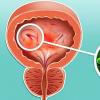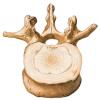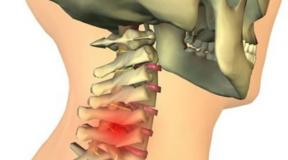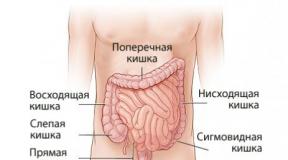The role of bacteria in nature. Bacteria. Distribution in nature
Bacteria are primitive, single-celled living organisms. They are widespread everywhere: on the surface or inside other organisms (animals, plants, humans), they are found in large numbers in soil and water bodies. Directly or indirectly, bacteria play an important role in human life.
Other living organisms, including humans, are one of the living environments for bacteria. The relationship that arises in this case can be different. There are bacteria that are beneficial. So, bacteria live in the human intestine (for example, E. coli), which promote digestion, synthesize some vitamins and interfere with the activity of pathogenic bacteria. In the case of excessive intake of antibacterial drugs, these beneficial bacteria die, which negatively affects health. The very same E. coli, thanks to the settlement in the human intestine, is constantly provided with nutrients.
Bacteria also live in the intestines of domestic ruminants, which form the basis of animal husbandry (cows, goats, sheep). Ruminants consume plant foods rich in fiber, but they cannot digest fiber on their own. This function is performed by bacteria.
Disease-causing bacteria can also be carried by blood-sucking insects. For example, fleas carry the plague pathogen, and lice carry typhus.
In humans, bacteria cause diseases such as sore throat, diphtheria, tuberculosis, typhus, dysentery, cholera, and many others, in animals - brucellosis, anthrax, etc. Bacterial diseases are treated with antibiotics and other medicines.
Bacteria are widely used in the human economy. So, since ancient times, a person has been using the ability of certain bacteria to induce fermentation to obtain certain products: lactic acid products (yoghurts, cheeses, kefir), butyric and acetic acids, etc. Leather tanning and flax fiber production are impossible without bacteria.
Certain groups of bacteria are also used in the microbiological industry to obtain antibiotics, vitamins and some other substances. In agriculture, they are used for silage of green fodder.
One of the important problems of our time is wastewater treatment. Wastewater treatment plants use bacteria that break down organic residues. In addition, by studying the number and species composition of bacteria in water, it is possible to determine the degree of pollution of water bodies. With the help of some bacteria, a person fights blood-sucking animals, pests of agriculture and forestry. Special bacterial preparations have been invented that infect only certain types of harmful bacteria.
Bacteria can harm human economic activities, for example, spoil food. In this case, the bacteria produce toxic substances that can poison the body of a person or animal if they eat spoiled food. For example, the bacillus of botulism can develop in canned meat and plant products, fish, sausage, if you do not adhere to strict rules of the technological process during canning. In order to completely get rid of bacteria in food products intended for long-term storage, they are sterilized or pasteurized.
Bacteria, according to scientists, are the most ancient inhabitants of the Earth. They appeared on the planet in time immemorial and for a long time were the only ones on it. Their structure is primitive. These are single-celled organisms, many of which still retain the main features of their ancestors who populated the Earth in ancient times. The importance of bacteria in nature and human life is even difficult to objectively assess.
Lots of
Since the invention of the first powerful microscope (17th century), which allows you to see these small and land, many have been discovered. In science, they have been singled out into a separate group, which is called “bacteria”. Before talking about the importance of bacteria in nature and human life, a few words about them.
A little about bacteria
They can be of various shapes. Cocci - spherical, bacilli - rod-shaped, vibrios - like commas, spirilla - spiral, streptococci - a chain, staphylococci - bunches, diplococci - rounded paired. All of them are able to move with the help of flagella or in other ways. Bacteria are found everywhere: even in drops of the purest water, in the soil, in the air, on stones and the surface of the skin. They are also found inside some other organisms, such as humans. Millions of bacteria can live in just one gram of black soil. They are unpretentious and extremely viable: they can withstand heating up to 90 degrees, do not die during freezing, rise into the atmosphere up to 30 km, sink into the soil for kilometers, live in the depths of the ocean - the real masters of our planet!

The importance of bacteria in nature and human life

The importance of bacteria in nature and human life. Advantages and disadvantages
However, these microscopic organisms are not only our helpers. From them there is also harm to nature and man. Bacteria carry some dangerous diseases: for example, cholera, tuberculosis and many others. They are capable of causing epidemics that can destroy humanity. Even various deadly things that are now forbidden in the world have been created. Therefore, a person needs to keep them under constant control.
These materials can be used for the lesson "The importance of bacteria in nature and human life" (grade 6).
The role of bacteria in nature. Bacteria play an important role on Earth. They take the most active part in the cycle of substances in nature. All organic compounds and a significant part of inorganic ones undergo significant changes with the help of bacteria. This role in nature for the processing of any organic matter into organic is of global importance. Appearing on Earth earlier than all organisms (more than 3.5 billion years ago), they created a living shell of the Earth and continue to actively process living and dead organic matter, involving their metabolic products in the circulation of substances. The circulation of substances in nature is the basis for the existence of life on Earth.
The decay of all plant and animal debris and the formation of humus and humus is mainly carried out by bacteria. Bacteria are a powerful biotic factor in nature.
The soil-forming work of bacteria is of great importance. The first soil on our planet was created by bacteria. However, in our time, the condition and quality of the soil depends on the functioning of soil bacteria. The so-called nitrogen-fixing nodule bacteria-symbionts of legumes are especially important for soil fertility. They saturate the soil with valuable nitrogen compounds.
Bacteria serve as nurses. They purify dirty wastewater by breaking down organic matter and turning it into harmless inorganic matter. This property of bacteria is widely used in wastewater treatment plants.
Bacteria in human life. In many cases, bacteria can be harmful to humans. So, saprophytic bacteria spoil food. To protect products from spoilage, they are subjected to special processing (boiling, sterilization, freezing, drying, chemical cleaning, etc.). If this is not done, food poisoning can occur.
Botulinum bacilli cause dangerous food poisoning called botulism, which often leads to death. The bacterium that causes botulism enters canned food with poorly washed food and actively develops in anoxic conditions with an abundance of protein. As a result of its vital activity, the terrible poison botulin accumulates in canned meat or mushrooms.
Disease-causing bacteria. Among bacteria, there are many disease-causing (pathogenic) species that cause disease in humans, animals or plants. Severe typhoid fever is caused by the bacterium Salmonella, and dysentery is caused by the bacterium Shigella. Disease-causing bacteria are carried through the air with droplets of a sick person's saliva when sneezing, coughing, and even during normal conversation (diphtheria, whooping cough). Some pathogenic bacteria are very resistant to drying out and persist for a long time in dust (tubercle bacillus). Bacteria of the genus Clostridium live in dust and soil - the causative agents of gas gangrene and tetanus. Some bacterial diseases are transmitted through physical contact with a sick person (sexually transmitted diseases, leprosy). Often, pathogenic bacteria are transmitted to humans using so-called vectors. For example, flies, crawling through sewage, carry thousands of pathogenic bacteria on their paws, and then leave them on products for human consumption.
Diseases can be associated with the penetration of bacteria into wounds. Deep wounds contaminated with soil develop bacteria that cause gas gangrene and tetanus. These diseases are very dangerous and often fatal. Superficial wounds and burns are easily infected with staphylococci and streptococci, which cause purulent inflammation.
The discovery of pathogenic bacteria made it possible to find means of combating many diseases. However, bacteria quickly adapt to drugs, and scientists have to develop more and more powerful drugs.
Human use of bacteria. The activity of some bacteria is used by humans in the production of medicines, various organic substances, and new food products. Special types of bacteria produce strong antibiotics (streptomycin, tetracycline, etc.) - substances that kill or suppress the development of pathogens.
Bacteria are widely used by humans in the production of various fermented milk products, cheeses, wine, vinegar, and vegetable sourdough.
People constantly have to keep different foods from spoiling. After all, any vegetable or fruit can rot. Meat, eggs, or fish may become rancid. Milk can turn sour, butter can turn rancid. A person often makes curdled milk, ryazhenka or kefir from sour milk himself. Sometimes in a damp forest in the dark, you can see how rotting wood glows with a mysterious greenish light.
In all such transformations, beautiful and ugly, harmful and used by humans, microscopic "garbage" are involved. it bacteria- the smallest unicellular organisms.
In addition to bacteria, there are many other "scavengers" on Earth. But bacteria destroy the smallest, most inedible, the most inaccessible parts of organisms for other processors. For example, the larvae of some beetles can inhabit a tree and make holes in it. Some mushrooms are capable of destroying this sick tree and turning it into dust. But when bacteria get down to business, not even dust remains.
If there were no bacteria-"scavengers", the Earth would be covered with dead plants, animals and fungi.
Bacteria, by processing organic waste, create nutrients for plants. Animals and humans consume these nutrients by consuming plants. This means that without bacteria, all plants on Earth would starve to death. And after them, both animals and people would have died out.
But can bacteria themselves do without plants and animals? It turns out, yes. The fact is that not all bacteria do the job of "scavengers". There are also bacteria-“breadwinners”. They have chlorophyll in their cells. Therefore, they are capable of photosynthesis, that is, they can form organic matter from water and carbon dioxide.
 |
| Anthony van Leeuwenhoek |
Usually bacterial cells are so small that it is difficult to see them even through a microscope. Therefore, scientists for a long time did not know anything about the existence of bacteria. Only three hundred years ago bacteria were first seen by a Dutch scientist Anthony van Leeuwenhoek into a microscope made by him. Material from the site
Much is known about bacteria today. For example, it is they who are involved in the formation of the soil. Soil bacteria transform the substances around them of complex structure into simple and soluble substances that can be assimilated by plants. Bacteria from the upper soil layers breathe oxygen, while bacteria from the lower layers are afraid of it. Special bacterial fertilizers are made from soil bacteria.
Many bacteria are known to live in food-processing system animals and humans. They help to digest food.
However, a very large number of bacteria dangerous for humans, because they cause disease.
On this page material on topics:
Natural history questions what are bacteria
The importance of bacteria in nature and human life message
The importance of bacteria in nature and human life abstract
Diversity of bacteria of their significance in nature and life of people
Useful bacteria
Questions about this material:



















